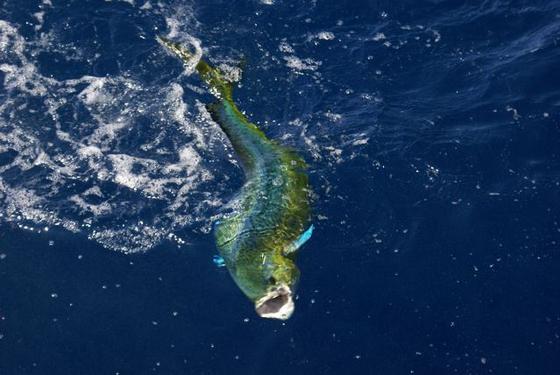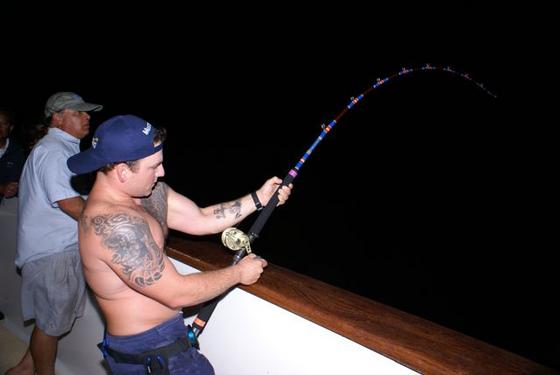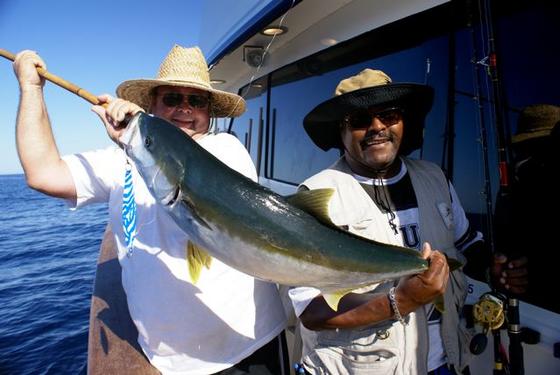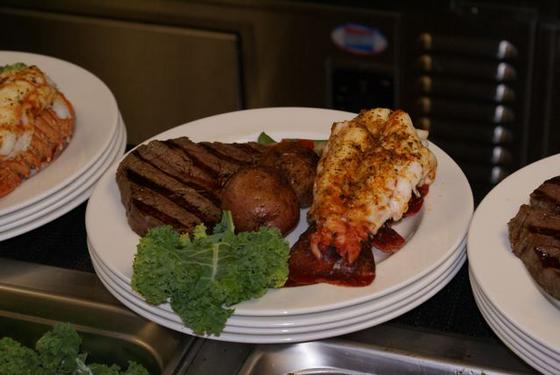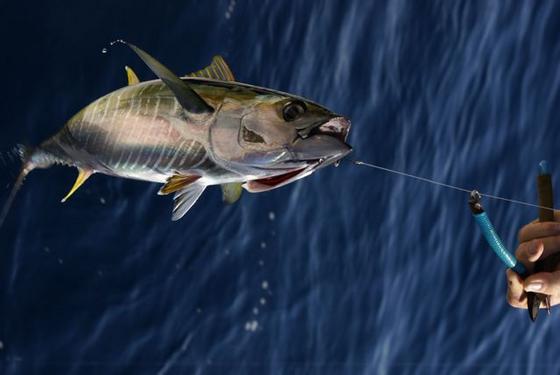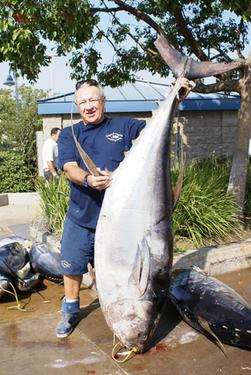Long Range Fish Report
From Sportfishing
From Sportfishing
Fish Report for 10-29-2007
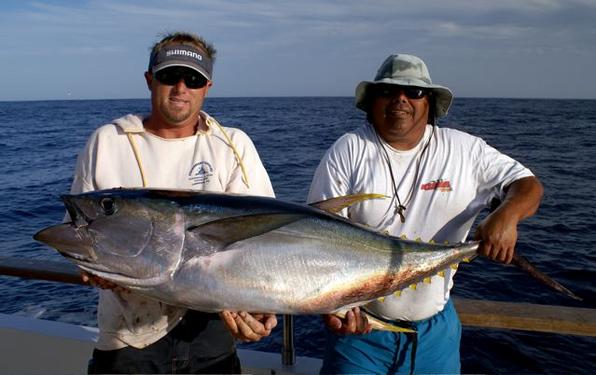
Fishing Baja's Length: Ten Days Aboard Intrepid: Part Two
10-29-2007
Bill Roecker
https://www.intrepid.net
We rolled up on the Potato Bank about dark. No life showed on the bottom, according to the down scanning sonar. No life came to the lights, either. Often olive grouper bite at the spot, but not this day. Several hours later the anchor came up and we headed southeast, to see if there were tuna closer to Cabo San Lucas.
We awoke offshore, somewhere between and outside of the Jaimie and Golden Gate banks. A huge marlin tournament was going on there, we heard, but we were miles away so as not to interfere. Marlin pestered our trolled jigs some, but we saw no tuna sign. Some boobies accompanied us for several miles as we began to work back to the northwest. They dove after the flying fish we raised.
We came upon some "shark buoys," two ends of a wadded-up longline. I caught a small dorado there, and we saw more of them, but it didn't look like the rig had been in the water very long. There were marlin there, too, of course. The clean blue 80-degree water just didn't seem to be holding tuna.
We cruised along in quiet style. Intrepid rolls so little while underway it's surprising, especially when the boat's in the trough. Long bunks and fine sheets and blankets make for a good rest while motoring. The galley is a pleasure, with comfy booth seating, three big flat screen displays, superior coffee makers and soft drinks from a fountain. You can enjoy the expected San Diego long range-style meal service at your table. Showers are large and easy to clean. The rig has five heads for anglers, excellent bait capacity and plenty of tackle space, although the top rack is a bit high for a six-footer to see into a tackle box.
At the end of the day we were back in the zone, at the outside southern banks. Two or three long rangers were there with us, cruising around, looking for some tuna business. We got a couple of fish at a couple of stops, and then finally had some luck.
A large bird school of shearwaters, terns and boobies showed us breaking tuna just before sunset. We rolled up to the head of the event, which was headed into the northwest breeze, and yellowfin charged the boat. Just about everyone who put a sardine out got bit quickly. The drift and the hooked-up tuna pulled most anglers into the upwind stern corner. Numerous fish were lost in tangles and cross-overs, but others came to gaff quickly, because they were 15 to 25-pounders.
Some of the tuna were bigger. That was the good news. The bad news was that no one had a heavy rig in use. Ron Adamson of Gig harbor, WA was fishing with 50-pound line, and got the eventual jackpot-winning 70.8-pound yellowfin during the sunsetter. But there were a few tuna over 100 pounds in that brief bite, and the first one bit on chartermaster Wayne Martin's 40-pound rig. Wayne tussled with the beast for a while, and then kindly handed it off to rookie long ranger Josh Neff of Arcata.
Josh was in excellent physical shape, and pulled long and hard on the tuna. Over an hour later, we could see it coming up off the bow, when the fish decided to go down the starboard side. It gained line during the move. When Josh had it back to the bow again the tuna, which looked to be 120 pounds or more, was no longer visible. The stalemate was ended when the big yellowfin broke off.
"That was our first real bite," said skipper Nichols at dinner shortly after. "We can stay here a maximum of two more days, but if we do that we'll have to straight-line it for home. I think we'll definitely stay here tomorrow to see if we can do this again; things are finally starting to look right."
The anglers voted with the skipper. We'd stay another day at least.
In the morning sea conditions were the best of the trip so far, with subsiding swells and fading chop. A few frigate birds were around, and we had a couple of tuna contacts that put fish on the boat, but no bite per se. Late in the morning a bird school got us excited and we got on biting fish again. They were dorado, and they were eager and plentiful.
Everyone was bit all at once again. Hooked fish were jumping everywhere around the rear half of Intrepid.
The bite continued to lunchtime, when we were limited out with six each. Twice during the bite I looked down swell to see the main body of fish, which didn't come close to the boat. The main school of dorado was about 300 yards long and at least 100 yards across. I couldn't see how deep it went, but the number of fish there was staggering. They were mostly 10 to 25 pounds.
A single tuna bit during the first part of the dorado melee. It was a 52-pounder that beat up Ben Cambron of San Jose for about an hour. Ben fought his fish back and forth across the stern, and somehow avoided disaster with gyrating dorado time after time. Ben won out in the end, and posed with his tuna, which later won third place.
We fished, drifting in a light, abating breeze through the rest of the long afternoon and had two more tuna schools near the boat. One bunch showed well but didn't bite at all. Small groups of tuna kept coming up, jumping and giving us brief shows a hundred yards down swell. Anglers resorted to fishing sardines under balloons and squid under the kite. Milo Rivera got his 85-pound tuna on a squid with the fishing kite. A couple of other tuna were hooked and caught on flylined sardines.
A big tuna bit on Jason Winbigler's sardine. Jason is a firefighter from San Bernadino. His 40-pound outfit was stressed to the max, and the fish took him around the boat at least once. Most of that fight was also on the bow, but during the later stages it went down the starboard side and came up off the port stern corner. He might had got the fish right there, but he was getting tired, and the rig was light for the fish. It went up the port side and back to the bow to sulk, and that's where it eventually chewed off the line and freed itself.
Saddened a bit by the loss, Jason was able to console himself with the second-place fish at the trip's end, a 54.6-pounder. He like almost all of the anglers hooked several marlin that day and the day before. The stripers put on some great airborne shows.
Jason's dad Mark Winbigler, also of San Bernadino, had better luck with his tuna, which was a bit smaller. Mark handled his tuna and got it to gaff, and then posed with the yellowfin cradled in his arms.
As it grew dark that day, we saw no fish and no birds. The breeze died, and we watched the sun slip below the ocean in quiet solitude. No sunsetter today. Skipper Nichols cranked up the Intrepid's quiet engines and we motored north while enjoying a rack of lamb dinner prepared by the Quintanar brothers.
We got to the 23 Spot next morning. The bottom was paved with red rockfish of a Mexican species that has a reputation for inedibility. When the next long ranger came up behind us we left the spot and went back to the 13 Spot, which was still producing small tuna and yellowtail with great regularity. These willing fish bit on bait and jigs. Many of the larger yellowtail came on yo-yoed iron. By the end of the day most had filled out their limits.
Cedros Island was the next day's destination. The last of the breeze died as we approached, and the skipper determined that 62-degree dirty water wouldn't work out, so he pointed the boat westerly, toward the Benitos Islands.
The water had pretty much gone flat greasy calm when we got out there, and it stayed that way for the rest of the trip. We could see a dirty haze on the shore and the horizon that may have been evidence of the fires that were burning in San Diego and Orange Counties. There was a bit of yellowtail action and Jason came up with a ten-pound calico bass, which he released. We left at dusk.
Big ling cod were biting the next day, south of San Martin Island and at a couple of sports just to the north of the volcanic island. Blue whales broached and fluked in the distance. We had time for a couple of hours of rock fishing and headed for the barn.
That last dinner was another great one made by Javier, a tasty lobster-steak combination that sent us to our bunks full to the gills. We docked at Point Loma Sportfishing the next morning at six, sorted the fish, and went home tanned and well-fed. Thanks to the Intrepid for a great ride, superb food, some fishing moments that were hard to get, and some that won't be forgotten.
Specifically, thanks to Accurate, Mustad, AFTCO and other sponsors for numerous prizes and gifts; and thanks to skipper Dan Nichols, second skipper Kevin Cleary and engineer John Hartwell, crewmen Rick Kelly and Chad Smith. Javier and Hector Quintanar deserve a special mention for incredible cusine.
We awoke offshore, somewhere between and outside of the Jaimie and Golden Gate banks. A huge marlin tournament was going on there, we heard, but we were miles away so as not to interfere. Marlin pestered our trolled jigs some, but we saw no tuna sign. Some boobies accompanied us for several miles as we began to work back to the northwest. They dove after the flying fish we raised.
We came upon some "shark buoys," two ends of a wadded-up longline. I caught a small dorado there, and we saw more of them, but it didn't look like the rig had been in the water very long. There were marlin there, too, of course. The clean blue 80-degree water just didn't seem to be holding tuna.
We cruised along in quiet style. Intrepid rolls so little while underway it's surprising, especially when the boat's in the trough. Long bunks and fine sheets and blankets make for a good rest while motoring. The galley is a pleasure, with comfy booth seating, three big flat screen displays, superior coffee makers and soft drinks from a fountain. You can enjoy the expected San Diego long range-style meal service at your table. Showers are large and easy to clean. The rig has five heads for anglers, excellent bait capacity and plenty of tackle space, although the top rack is a bit high for a six-footer to see into a tackle box.
At the end of the day we were back in the zone, at the outside southern banks. Two or three long rangers were there with us, cruising around, looking for some tuna business. We got a couple of fish at a couple of stops, and then finally had some luck.
A large bird school of shearwaters, terns and boobies showed us breaking tuna just before sunset. We rolled up to the head of the event, which was headed into the northwest breeze, and yellowfin charged the boat. Just about everyone who put a sardine out got bit quickly. The drift and the hooked-up tuna pulled most anglers into the upwind stern corner. Numerous fish were lost in tangles and cross-overs, but others came to gaff quickly, because they were 15 to 25-pounders.
Some of the tuna were bigger. That was the good news. The bad news was that no one had a heavy rig in use. Ron Adamson of Gig harbor, WA was fishing with 50-pound line, and got the eventual jackpot-winning 70.8-pound yellowfin during the sunsetter. But there were a few tuna over 100 pounds in that brief bite, and the first one bit on chartermaster Wayne Martin's 40-pound rig. Wayne tussled with the beast for a while, and then kindly handed it off to rookie long ranger Josh Neff of Arcata.
Josh was in excellent physical shape, and pulled long and hard on the tuna. Over an hour later, we could see it coming up off the bow, when the fish decided to go down the starboard side. It gained line during the move. When Josh had it back to the bow again the tuna, which looked to be 120 pounds or more, was no longer visible. The stalemate was ended when the big yellowfin broke off.
"That was our first real bite," said skipper Nichols at dinner shortly after. "We can stay here a maximum of two more days, but if we do that we'll have to straight-line it for home. I think we'll definitely stay here tomorrow to see if we can do this again; things are finally starting to look right."
The anglers voted with the skipper. We'd stay another day at least.
In the morning sea conditions were the best of the trip so far, with subsiding swells and fading chop. A few frigate birds were around, and we had a couple of tuna contacts that put fish on the boat, but no bite per se. Late in the morning a bird school got us excited and we got on biting fish again. They were dorado, and they were eager and plentiful.
Everyone was bit all at once again. Hooked fish were jumping everywhere around the rear half of Intrepid.
The bite continued to lunchtime, when we were limited out with six each. Twice during the bite I looked down swell to see the main body of fish, which didn't come close to the boat. The main school of dorado was about 300 yards long and at least 100 yards across. I couldn't see how deep it went, but the number of fish there was staggering. They were mostly 10 to 25 pounds.
A single tuna bit during the first part of the dorado melee. It was a 52-pounder that beat up Ben Cambron of San Jose for about an hour. Ben fought his fish back and forth across the stern, and somehow avoided disaster with gyrating dorado time after time. Ben won out in the end, and posed with his tuna, which later won third place.
We fished, drifting in a light, abating breeze through the rest of the long afternoon and had two more tuna schools near the boat. One bunch showed well but didn't bite at all. Small groups of tuna kept coming up, jumping and giving us brief shows a hundred yards down swell. Anglers resorted to fishing sardines under balloons and squid under the kite. Milo Rivera got his 85-pound tuna on a squid with the fishing kite. A couple of other tuna were hooked and caught on flylined sardines.
A big tuna bit on Jason Winbigler's sardine. Jason is a firefighter from San Bernadino. His 40-pound outfit was stressed to the max, and the fish took him around the boat at least once. Most of that fight was also on the bow, but during the later stages it went down the starboard side and came up off the port stern corner. He might had got the fish right there, but he was getting tired, and the rig was light for the fish. It went up the port side and back to the bow to sulk, and that's where it eventually chewed off the line and freed itself.
Saddened a bit by the loss, Jason was able to console himself with the second-place fish at the trip's end, a 54.6-pounder. He like almost all of the anglers hooked several marlin that day and the day before. The stripers put on some great airborne shows.
Jason's dad Mark Winbigler, also of San Bernadino, had better luck with his tuna, which was a bit smaller. Mark handled his tuna and got it to gaff, and then posed with the yellowfin cradled in his arms.
As it grew dark that day, we saw no fish and no birds. The breeze died, and we watched the sun slip below the ocean in quiet solitude. No sunsetter today. Skipper Nichols cranked up the Intrepid's quiet engines and we motored north while enjoying a rack of lamb dinner prepared by the Quintanar brothers.
We got to the 23 Spot next morning. The bottom was paved with red rockfish of a Mexican species that has a reputation for inedibility. When the next long ranger came up behind us we left the spot and went back to the 13 Spot, which was still producing small tuna and yellowtail with great regularity. These willing fish bit on bait and jigs. Many of the larger yellowtail came on yo-yoed iron. By the end of the day most had filled out their limits.
Cedros Island was the next day's destination. The last of the breeze died as we approached, and the skipper determined that 62-degree dirty water wouldn't work out, so he pointed the boat westerly, toward the Benitos Islands.
The water had pretty much gone flat greasy calm when we got out there, and it stayed that way for the rest of the trip. We could see a dirty haze on the shore and the horizon that may have been evidence of the fires that were burning in San Diego and Orange Counties. There was a bit of yellowtail action and Jason came up with a ten-pound calico bass, which he released. We left at dusk.
Big ling cod were biting the next day, south of San Martin Island and at a couple of sports just to the north of the volcanic island. Blue whales broached and fluked in the distance. We had time for a couple of hours of rock fishing and headed for the barn.
That last dinner was another great one made by Javier, a tasty lobster-steak combination that sent us to our bunks full to the gills. We docked at Point Loma Sportfishing the next morning at six, sorted the fish, and went home tanned and well-fed. Thanks to the Intrepid for a great ride, superb food, some fishing moments that were hard to get, and some that won't be forgotten.
Specifically, thanks to Accurate, Mustad, AFTCO and other sponsors for numerous prizes and gifts; and thanks to skipper Dan Nichols, second skipper Kevin Cleary and engineer John Hartwell, crewmen Rick Kelly and Chad Smith. Javier and Hector Quintanar deserve a special mention for incredible cusine.
Photos
< Previous Report Next Report >
More Reports
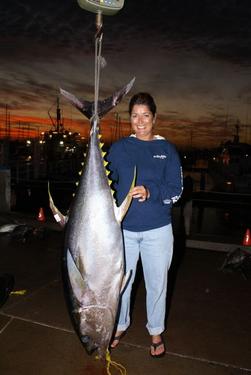
10-29-2007
Roy Rose docked Royal Polaris October 29 after a ten-day open trip to Alijos Rocks, the southern banks and an...... Read More

LongRangeSportfishing.net © 2025. All Rights Reserved.
Website Hosting and Design provided by TECK.net
Website Hosting and Design provided by TECK.net

